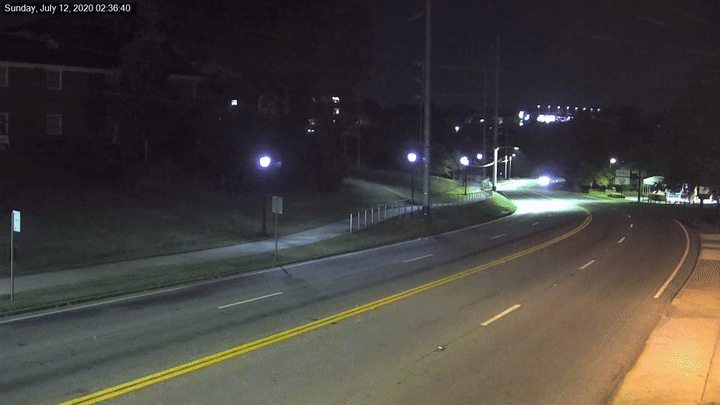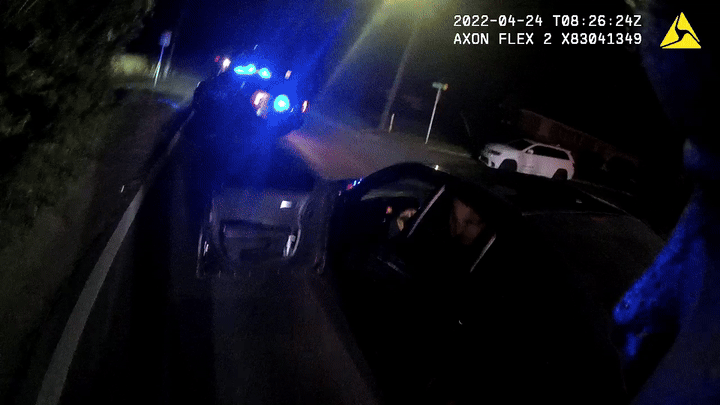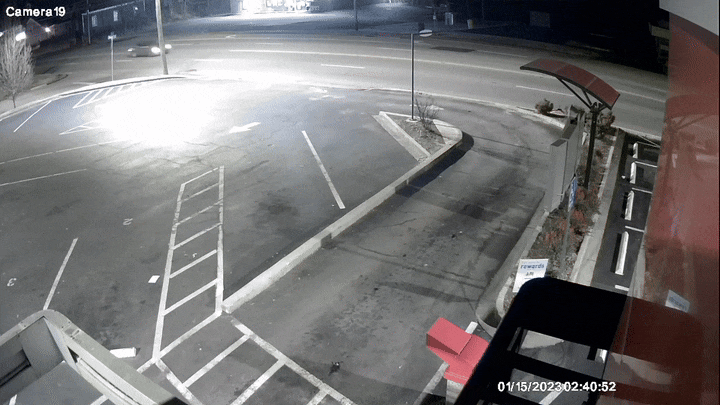





The University of Georgia football team has a speeding problem.
Under head coach Kirby Smart, dozens of players have been cited for excessive speeding, reckless driving, racing or other serious traffic offenses.
In 2020, running back James Cook drove a pickup truck at high speeds near downtown Athens. At one point he crossed the center line into oncoming traffic.
Moments later, Cook slammed into five cars in a parking lot.
In 2022, running back Kenny McIntosh was speeding when his Dodge Charger struck an Uber driver’s SUV. The crash sent her to the hospital.
Athens police have been ticketing players and urging them to slow down.
It hasn't worked.
‘Out of control’: Reckless culture off the field marks UGA football team
No one knows for certain how fast Kenny McIntosh drove through a residential neighborhood one Sunday morning last year. To the Athens police, though, it was too fast. McIntosh’s speed, an officer noted, posed “an immediate threat to public safety.”
Two miles south of the University of Georgia, where McIntosh played on the national-champion football team, his high-performance Dodge Charger struck an Uber driver’s Kia compact SUV with such force that it ripped wheels off both vehicles. The police arrested McIntosh on charges that included reckless driving — his third traffic offense in less than six months. A judge later fined him $685.
Any penalty imposed by McIntosh’s coaches apparently was far less severe.
McIntosh, a running back, played in all 15 of Georgia’s games last season, amassing more than 1,300 yards of offense, including 126 in a national semifinal game against Ohio State. His value to the team outweighed the gravity of his offenses.
The episode illustrates a permissive culture that undergirds the nation’s premier college football program, an investigation by The Atlanta Journal-Constitution found.
Since Kirby Smart became Georgia’s head coach in late 2015, dozens of players have engaged in reckless, often lawless behavior that put them and others in jeopardy: excessive speeding, street racing and driving under the influence, among other offenses. Players have illegally brought weapons onto Georgia’s campus. They’ve gotten into bar fights. They’ve been charged with domestic violence and sexual assault.
But Smart almost always lets athletes continue playing despite their off-field transgressions. Suspensions are unusual, dismissals from the team even rarer.
Exactly how Smart punishes players is unclear. In one instance, in 2019, he ordered six players who had been arrested over the previous six weeks to run the steps of Sanford Stadium in front of a select audience of donors to Georgia’s athletics department. Otherwise, he routinely declines to disclose disciplinary actions after players break team rules or the law.
“Everybody wants to know what the punishment is,” Smart said after a recent string of arrests. “Well, the players know what the punishment is.”
The football program’s tolerance for risky behavior was laid bare by a tragedy that rocked the team and the university alike: a fatal high-speed car crash on Jan. 15 that followed celebrations of Georgia’s second consecutive national championship. The team’s star defensive player, Jalen Carter, later pleaded no contest to reckless driving and racing charges in connection with the crash. He paid a $1,013 fine and is serving 12 months’ probation.
Carter’s arrest brought unwanted attention nationally to a Georgia football program at the pinnacle of its sport. But he is hardly the only player who has faced legal troubles, the Journal-Constitution found through an examination of hundreds of court cases, police reports, videos from police officers’ body-worn cameras and emails between the school’s athletics department and court officials.
During Smart’s time as the head coach, when about 350 athletes comprised his rosters, the police have charged Georgia players with traffic offenses nearly 300 times. Many violations were minor: not wearing a seatbelt or using a hand-held mobile device while driving, for example.
But at least 60 times, players were caught driving 20 mph or more over the speed limit. They exceeded the limit by more than 30 mph in at least 14 of these instances and by 40 mph or more at least seven times.
Three players broke the 100 mph mark — one on a street where the speed limit is 35.
In a statement, the school’s athletic association said it is placing “increased emphasis on motor vehicle safety, responsibility and accountability” for its athletes.
“The recent incidents of reckless driving are completely unacceptable, and the University of Georgia Athletic Association is addressing this conduct with appropriate action, including a range of disciplinary measures,” the statement said. Those measures may include suspensions from competition, community service, mental health treatment and, since February, meetings with Josh Brooks, Georgia’s athletic director, “to assess and address the high-risk behavior.”
Specific penalties, however, are confidential, the statement said.
Credit: HYOSUB SHIN / AJC
Players’ speeds have risen sharply in recent years, an analysis by the Journal-Constitution shows. In 2019, Georgia players who received speeding citations drove an average of 54 mph. So far in 2023, the average speed is 79.
The increase generally coincides with the emergence of name, image and likeness deals between players and sponsors. Multiple players acquired Dodge Chargers and other high-powered vehicles, and many drive through Athens in a manner that can seem alarming.
In April, two residents of an historic district near downtown complained about a Charger whose driver repeatedly spun out on their street, squealing tires and loudly revving the engine morning and night. A police officer traced the car to Mykel Williams, a defensive lineman who lived nearby, and warned the athlete he might be arrested if the reckless driving continued.
“It’s been annoying,” one of the residents told the police. “But if he ended up on the side of the street, then it becomes dangerous.”
“Clearly,” the resident added, “it’s out of control.”
Reckless
Kenny McIntosh’s Charger kept rolling down the street despite losing its driver’s-side front wheel after striking Uber driver Tenisha Burwell’s Kia at 4 a.m. on April 24, 2022. He told the police he was driving about 60 mph on the narrow two-lane street. The speed limit is 40.
McIntosh was not wearing a seat belt but escaped injury, in part because the car’s airbags inflated. Burwell complained of chest and leg pain but at first declined emergency medical attention, worried her health insurance wouldn’t pay for it. She went to the hospital only after she slipped into and out of consciousness several times.
The collision totaled her car, but she recovered from her injuries, Burwell said in a recent interview. She didn’t want to say more about the crash.
“Athens is very small,” she said. “People are very particular about UGA football.”
The deference shown to football players may contribute to their recklessness. Traffic tickets, arrests, warnings and collisions seem to have little effect as deterrents.
Running back Kendall Milton, for example, has been cited at least five times since enrolling at Georgia in 2020. In 2022 alone, the police stopped him three times: once for “improper driving,” once for going 92 mph and another time for driving 84 mph. Both speeding citations occurred in 65-mph zones.
This year, officers ticketed Milton again for speeding and, in a separate incident, they questioned him after residents of an Athens apartment complex complained about several cars burning rubber in the parking lot early one morning.
Linebacker Nolan Smith also received five speeding-related tickets between 2019 and 2022, while in just two years, defensive back Javon Bullard was cited three times: once for speeding, once for causing a minor car crash and once for driving under the influence. Smart suspended Bullard for a single game over the DUI charge.
Running back James Cook remained on the field despite two serious violations.
The Athens police arrested Cook in December 2019 for having an open container of Hennessy cognac in his car and for driving without a valid license. The officer who pulled him over smelled what he suspected was marijuana, but Cook said he had none in his car “because he smoked it,” a police report said.
School policy calls for at least a one-game suspension for marijuana use. But Smart kept Cook in the lineup for the season’s final game, the Sugar Bowl. Smart said at the time that Cook had passed a drug test administered by Georgia’s athletic department after his arrest.
“It’s that simple,” Smart said.
Early one morning about seven months later, in July 2020, Cook was driving a borrowed pickup truck near downtown Athens when he plowed into a small parking lot. He struck five unoccupied cars but, somehow, walked away unhurt.
When the police arrived, Cook said the truck’s brakes had failed. Video from surveillance cameras told a different story.
Moments before the crash, Cook drove “greatly in excess of the posted speed limit,” as fast as 85 mph, a police commander said in an email to his superior. At one point, Cook crossed the center line, narrowly missing a vehicle approaching from the opposite direction.
As with his earlier arrest, this incident had no apparent effect on Cook’s standing with the football program. He sat out just one regular-season game in 2020, and that was because of an injury.
By last fall, the police in Athens regularly encountered football players driving at excessive speeds, public records show.
Credit: Hyosub.Shin@ajc.com
One day in October, an officer pulled over cornerback Kelee Ringo for driving 91 in a 65-mph zone. The officer let Ringo go with a warning. Six days later, the same officer stopped Ringo again on the same road. This time, he ticketed Ringo for driving 94 mph.
Jalen Carter was driving nearly twice the speed limit — 89 in a 45-mph zone — when an officer stopped him last September on a busy street near downtown Athens. The officer gave Carter a ticket and a stern talk.
“I’ve stopped a bunch of y’all’s football players,” the officer told Carter, body-cam video shows. “Y’all need to slow down, dude.”
The officer told Carter he had issued speeding tickets to Darnell Washington, a Georgia tight end, the previous day and another player, offensive lineman Dylan Fairchild, earlier the same day. The officer suggested that Carter talk to his teammates about their driving, which he depicted as “dumb” and “reckless.”
“Slow down, OK?” the officer said. “That’s all I ask.”
‘Knuckleheads’
When Georgia players get into legal trouble, the football program comes to their aid.
Bryant Gantt is the team’s director of player support and its unofficial law enforcement liaison. He schedules players’ court dates, negotiates their plea deals and delivers cash to the courthouse to pay their fines. He accompanies players to the police station for questioning, both as witnesses to crimes and as suspects.
“He’s like their babysitter,” said Janna Landreth, a longtime deputy solicitor for Athens-Clarke County. “Maybe to their detriment.”
Gantt contacted court officials on 82 separate legal matters involving players between 2016 and 2023, emails reviewed by the Journal-Constitution show. Some messages read like exchanges between friends, such as when Gantt offered tickets to a Georgia football game to employees of the county solicitor’s office.
More often, Gantt seeks help on behalf of players — his “knuckleheads,” as he frequently describes them.
In September 2020, with James Cook’s court date in his reckless-driving case approaching, Gantt worked on a plea deal with the county solicitor’s office. Landreth offered to drop two charges if Cook pleaded guilty to reckless driving, emails show. Cook would have to pay a $670 fine and make restitution to the owners of no more than two of the five vehicles he struck. He also would be on probation until he made the payments and completed a defensive-driving course.
But Cook failed to appear in court when his case was called. In an email headed “CODE RED,” Gantt told Landreth that Cook’s absence was “totally my fault” and asked her to reschedule the court appearance so he wouldn’t be at risk of arrest.
“No worries,” Landreth replied. Cook faced no consequences for missing court.
Landreth, now in private practice, said in an interview that neither Cook nor other football players received special treatment because of Gantt’s involvement. She sees nothing wrong with Gantt’s helping the players.
“These kids,” she said, “have a lot on their plates.”
Credit: Curtis Compton / Curtis.Compton@
Gantt goes to great lengths to smooth players’ dealings with the court system, sometimes making sure they don’t even have to go to the courthouse to resolve citations or other matters.
On Oct. 5 last year, he emailed a list of names to Lisa Lowe, the chief deputy clerk of the Athens-Clarke County Municipal Court, and asked, “Can you check on tickets for the following knuckleheads?”
All three — Jalen Carter, Jamon Dumas-Johnson and Jackson Meeks — had “past-due infractions,” Lowe responded. At least one was in danger of his driver’s license being suspended.
Gantt made arrangements to deliver cash to the clerk’s office to pay the players’ fines. None of the players lost his license, and their cases were closed without their having to appear in court.
In an email to Lowe, Gantt said the players’ parents would send him money for the fines. In Carter’s court records, a clerk inserted a misspelled notation: “Gant paid @ counter.”
In its statement, Georgia’s athletic association said its funds were “never used to pay court fines or speeding tickets.”
“The funds always come from the players themselves or their families,” the statement said. “In certain situations where a student-athlete could not appear when required, Mr. Gantt has assisted in the process of paying these fines, and cash was often the only feasible method of payment as the court generally will not accept a credit card without the cardholder being present.”
A week after Gantt arranged to pay fines for Carter, Dumas-Johnson and Meeks, he told Lowe that Smart had grown concerned about his players’ driving habits and wanted to make sure coaches knew who was getting into trouble and why.
“I met with Coach Smart yesterday about guys not reporting their traffic tickets,” Gantt wrote last Oct. 13. “He asked me was there a way that we could scan the court documents or something periodically to see who has pending tickets or a court date.”
Lowe offered Gantt a login for the court’s computer system, which is not generally accessible to the public. She ended up adding him to a group email that lists each week’s docket of cases.
Although Gantt had become a familiar figure in the Athens-Clarke County courthouse, his efforts to minimize legal troubles for players and other people associated with Georgia’s athletics department were not widely known. That changed in January.
About 2:30 a.m. Jan. 15, two cars left downtown Athens, racing at more than 100 mph. Jalen Carter drove a high-powered Jeep Grand Cherokee Trackhawk, which he acquired through a name, image and likeness deal with an Ohio car dealer. Chandler LeCroy, a recruiting analyst, drove a Ford Expedition the university had rented to escort recruits and their families during a weekend of celebrations. LeCroy and a passenger, offensive lineman Devin Willock, died when the Expedition left the road and struck utility poles, trees and an apartment building.
Both drivers had been cited in recent months for driving well above the speed limit. And both had received Gantt’s help handling their tickets.
‘Slow down’
When Smart publicly addressed the fatal crash for the first time, he strongly defended his management of the football team.
“We’ve got complete control of our program and our kids in our program,” Smart said on March 14. To deal with players’ fast driving, he said, he had brought in police officers to speak about the dangers of speeding and racing.
But even after the deaths of LeCroy and Willock, some players don’t seem to have gotten the message.
Wide receiver Marcus Rosemy-Jacksaint was cited three times just last month: for driving 20 mph over the speed limit on May 15, 31 mph over on May 16 and 45 mph over — 90 in a 45-mph zone — on May 23. An Athens police officer arrested him on a reckless-driving charge after the latest traffic stop.
DeNylon Morrissette, another wide receiver, was driving his Dodge Charger on Ga. 316 in Oconee County about 3:30 a.m. May 8 when he rear-ended another car. An officer reported that he smelled marijuana in Morrissette’s car and noticed his bloodshot eyes. The officer arrested Morrissette on charges of driving under the influence of drugs, following too closely and driving too fast for conditions.
Weeks earlier, another police officer had stopped Morrissette for driving 81 in a 45-mph zone.
Like Carter the previous September, Morrissette got a lecture with his ticket.
“Y’all got to slow down,” the officer told him. “We’ve been getting all of y’all a lot. You obviously know about the wreck and stuff. Y’all got to slow down.”
To emphasize his point, the officer then invoked another authority.
“I’m sure,” he said, “that Kirby wouldn’t be happy about all of this.”
Data specialists Stephanie Lamm and Justin Price contributed to this report.
Response from UGA Athletic Association
In response to questions from The Atlanta Journal-Constitution, the University of Georgia Athletic Association issued a statement on its handling of traffic violations and other offenses by its football players:
“The recent incidents of reckless driving are completely unacceptable, and the University of Georgia Athletic Association is addressing this conduct with appropriate action, including a range of disciplinary measures.
“Measures can range from suspensions and athletic participation restrictions, to community service, to mental health treatment and mandated educational programs. …
“In response to the severity of more recent behavior, we proactively introduced punitive measures to heighten consequences. As an example, we are updating our awards policy to enable student-athlete monetary awards to potentially be reduced for serious misconduct. And, when we now become aware of more serious infractions – such as a Super Speeder violation – the disciplinary process involves a one-on-one meeting with the Director of Athletics to assess and address the high-risk behavior. … We will continue to implement and refine our internal disciplinary measures with increased emphasis on motor vehicle safety, responsibility and accountability.”


